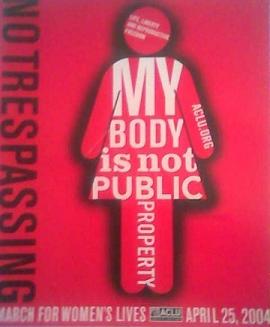State ownership of the means of reproduction. (#2)
(Via Miriam @ feministing 2008-06-18, via Feminist in Pink 2008-06-22.)

Here is the latest proposal from the American Medical Association, to have the government insist that every birth is properly institutionalized, so that they can make sure every birth leads to a fat and healthy hospital bill, with a proper Birth Guild-certified Expert looking over every midwife’s shoulder and between every expectant mother’s legs. And if the expectant mother doesn’t want that kind of a birth, well, she’d better learn to want it–or else.
Whereas, Twenty-one states currently license midwives to attend home births, all using the certified professional midwife (CPM) credential (CPM or
laymidwives), not the certified midwives (CM) credential which both the American College of Obstetricians and Gynecologists (ACOG) and American College of Nurse Midwives (ACNM) recognize; andWhereas, There has been much attention in the media by celebrities having home deliveries, with recent Today Show headings such as
Ricki Lake takes on baby birthing industry: Actress and former talk show host shares her at-home delivery in new film; andWhereas, An apparently uncomplicated pregnancy or delivery can quickly become very complicated in the setting of maternal hemorrhage, shoulder dystocia, eclampsia or other obstetric emergencies, necessitating the need for rigorous standards, appropriate oversight of obstetric providers, and the availability of emergency care, for the health of both the mother and the baby during a delivery; therefore be it
RESOLVED, That our American Medical Association support the recent American College of Obstetricians and Gynecologists (ACOG) statement that
the safest setting for labor, delivery, and the immediate post-partum period is in the hospital, or a birthing center within a hospital complex, that meets standards jointly outlined by the American Academy of Pediatrics (AAP) and ACOG, or in a freestanding birthing center that meets the standards of the Accreditation Association for Ambulatory Health Care, The Joint Commission, or the American Association of Birth Centers(New HOD Policy); and be it furtherRESOLVED, That our AMA develop model legislation in support of the concept that
the safest setting for labor, delivery, and the immediate post-partum period is in the hospital, or a birthing center within a hospital complex, …(Directive to Take Action)— American Medical Association, Resolution 205: Home Deliveries
Note especially the second Whereas;
the AMA has, more or less explicitly, called for government force against home-birthing mothers because recent cultural trends suggest that women might be persuaded to choose otherwise if allowed to choose freely. The birth freedom group The Big Push for Midwives has this to say:
WASHINGTON, D.C. (June 16, 2008) — Just in time for Father's Day, at its annual meeting last weekend, the American Medical Association (AMA) adopted a resolution to introduce legislation outlawing home birth, and potentially making criminals of the mothers who choose home birth with the help of Certified Professional Midwives (CPMs) for their families.
It's unclear what penalties the AMA will seek to impose on women who choose to give birth at home, either for religious, cultural or financial reasons—or just because they didn't make it to the hospital in time,said Susan Jenkins, Legal Counsel for The Big Push for Midwives 2008 campaign.What we do know, however, is that any state that enacts such a law will immediately find itself in court, since a law dictating where a woman must give birth would be a clear violation of fundamental rights to privacy and other freedoms currently protected by the U.S. Constitution.Until the AMA proposed
Resolution 205 on Home Deliveries,no state had considered legislation forcing women to deliver their babies in the hospital or limiting the choice of birth setting. Instead, states have regulated the types of midwives that may legally provide care. Currently, 22 states already license and regulate CPMs, who specialize in out-of-hospital maternity care and have received extensive training to qualify as experts in the types of risk assessment and preventive care necessary for safe and high-quality care for women who choose give birth at home. Certified Nurse Midwives (CNMs), who are trained primarily as hospital-based providers, are licensed in all 50 states and the District of Columbia.The resolution did not offer any science-based information for the AMA's anti-midwife or anti-home birth position.
Maternity care is a multi-billion dollar industry in the United States,said Steff Hedenkamp, Communications Coordinator for The Big Push for Midwives.So it's no surprise to see the AMA join the American College of Obstetricians and Gynecologists in its ongoing fight to corner the market and ensure that the only midwives able to practice legally are hospital-based midwives forced to practice under physician control. I will say, though, that I'm shocked to learn that the AMA is taking this turf battle to the next level by setting the stage for outlawing home birth itself—a direct attack on those families who choose home birth, who could be subject to criminal prosecution if the AMA has its way.
For what it’s worth, I suppose it’s true that if the emanations and penumbras of the Bill of Rights provide for a right of privacy from government interference in adult women’s decisions to use contraception or abort a first-trimester pregnancy, they probably also provide for a right of privacy from government interference in where a woman chooses to give birth. And if a state should pass any of the AMA’s contemptible model legislation
and somebody takes up the issue in federal court, I hope that they’ll win.
But setting aside the politico-legal maneuvering for the moment, should anyone really even care what the Constitution says about it? If the Constitution does authorize this kind of tyrannical state intervention in women’s reproductive choices, then to hell with the Constitution. The important argument here is the moral one, about what simple justice demands. And taken from the standpoint of simple justice for women, it is absurd that I should even have to sit here and type out, in so many words, that a birth experience rightly belongs to the woman who labors on it–not to the AMA, not to a hospital, and not to the State.
Of course it does. Christ. To hell with any know-it-all blowhard busybody, with any association of know-it-all blowhard busybodies, or with any document that says otherwise.
